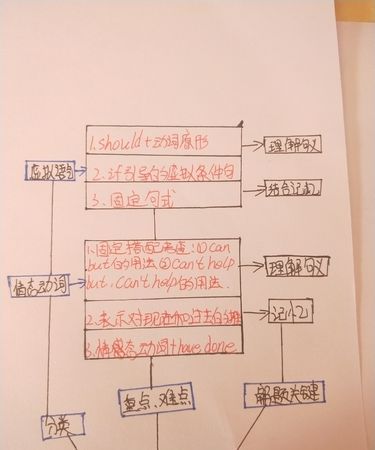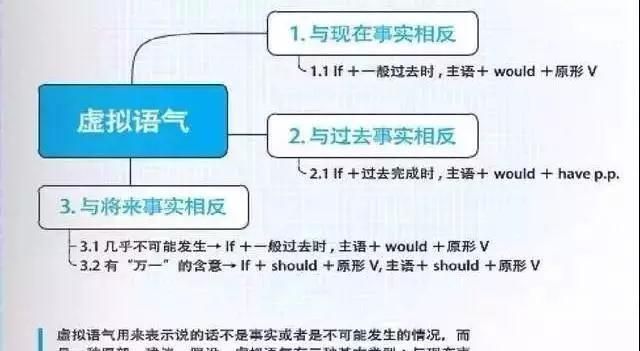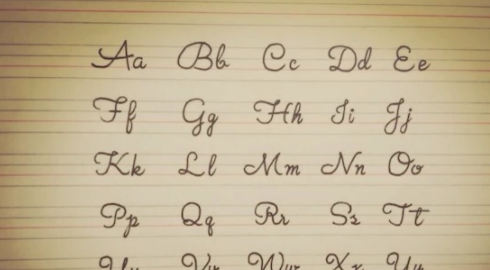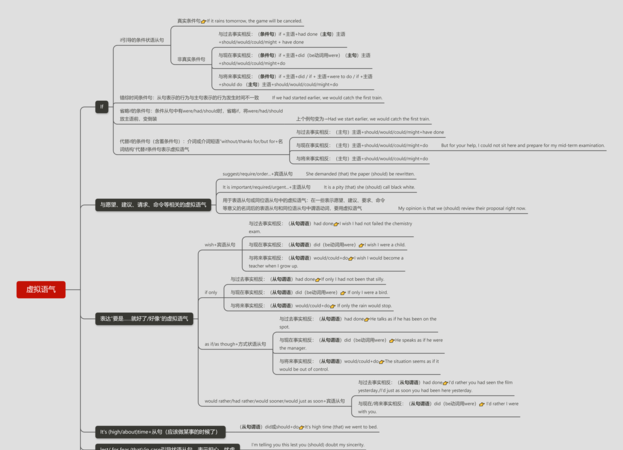本文目录
高中英语介词的用法归纳
虚拟语气是英语中的一个常见表达方式,一般是在表达主观想法、愿望、猜想、怀疑、建议时使用。
虚拟语气的用法归纳
虚拟语气通过谓语动词的特殊形式来表示。英语中的语气分为陈述语气、祈使语气、虚拟语气、疑问语气和感叹语气五类。下面是虚拟语气的使用一览表:
虚拟语气表示说话者做出的假设而非事实,或难以实现的情况,甚至表达彻底相反的概念。此外如需表达主观愿望或某种强烈的感情时,也可用虚拟语气。即当一个人说话时欲强调其所说的话是基于自己的主观想法,愿望,假想,猜测,怀疑或建议,而不是根据客观实际,就用虚拟语气,主要是英语语法的一种表达。
虚拟语气表示说话人的主观愿望、猜疑、建议或与事实不符的假设等,而不表示客观存在的事实。虚拟语气是由句中的谓语动词的特殊形式表示出来的。在条件状语从句中可分为两类,一类为真实条件句,一类为非真实条件句。非真实条件句表示的是假设或实际可能性不大的甚至完全不可能发生的情况,故采用虚拟语气。

高中虚拟语气的用法归纳
一、 条件句中的虚拟语气
1. 条件句中虚拟语气的形式
从句中提出一种与客观现实不相符或根本不可能存在的条件,主句会产生的一种不可能获得的结果。条件句中的虚拟语气根据不同的时间有三种不同的形式。
时间
从句谓语形式
主句谓语形式
将来
动词过去式(be用were)
should + 动词原形
were to + 动词原形
would / should / might / could + 动词原形
现在
动词过去式(be 用 were)
would / should / might / could + 动词原形
过去
had +动词过去分词
would / should / might / could have + 动词过去分词
2. 条件句中的虚拟语气的举例
(1) 将来时的条件句中的虚拟语气。如:
If he should go to Qing Hua University, he would make full use of his time. 如果他要上清华大学的话,他就会充分利用他的时间了。
If he were to come here, he would tell us about it. 如果他要来的话,他会通知我们一声。
(2) 现在时的条件句中的虚拟语气。如:
If he were free, he would help us. 要是他有空的话,它会帮助我们的。
If he studied at this school, he would know you well. 如果他在这所学校学习的话,它会对你很熟悉。
(3) 过去时的条件句中的虚拟语气。如:
If I had seen the film, I would have told you about it. 我如果看过这场电影,我会把电影内容告诉你了。
If I had got there earlier, I would have met Mr. Li. 如果我早点到那儿,我就会会到了李先生。
3. 运用条件句中的虚拟语气时,须注意的几个问题
(1) 当从句的主语为第三人称单数时,谓语动词若是系动词be时,可用 was 代替 were。但在倒装虚拟结构及 if I were you, as it were 中,只能用 were。如:
Were I ten years younger, I would study abroad. 要是我还年轻十岁的话,我会去国外学习。
If I were you, I would try my best to grasp the chance. 要是我是你的话,我要尽力抓住这次机会。
(2) 有时,虚拟条件句中,主、从句的动作若不是同时发生时,须区别对待。
①从句的动作与过去事实相反,而主句的动作与现在或现在正在发生的事实不符。如:
If I had worked hard at school, I would be an engineer, too. 如果我在学校学习刻苦的话,我现在也会使工程师了
If they had informed us, we would not come here now. 如果他们通知过我们的话,我们现在就不会来这里了。
②从句的动作与现在事实相反,而主句的动作与过去事实不符。如:
If he were free today, we would have sent him to Beijing. 如果他今天有空的话,我们会已经派他去北京了。
If he knew her, he would have greeted her. 要是他认识她的话,他肯定会去问候她了。
③从句的动作与过去发生的情况相反,而主句的动作与现在正在发生的情况相反。如:
If it had not been raining too much, the crops would be growing much better. 如果天不下太多的雨的话,庄家会长得更好。
If he had been working hard, he would be working in the office now. 要是他工作一直努力的话,他现在已进了办公室了。
(3) 当虚拟条件句的谓语动词含有 were, should, had 时,if 可省略,而将 were, should, had等词置于句首。如:
Should he agree to go there, we would send him there. 要是他答应去的话,我们就派他去。
Were she here, she would agree with us. 如果她在这儿的话,她会同意我们的。
Had he learnt about computers, we would have hired him to work here. 如果她懂一些电脑知识的话,我们会已经聘用他来这里工作了(from ***)。
(4) 有时,句子没有直接给出假设情况的条件,而须通过上下文或其他方式来判断。如:
I would have come to see you, but I was too busy. 我本该来看你了,然而我太忙了。
But for his help, we would be working now. 要不是他的帮助,我们还会在工作呢。
Without your instruction, I would not have made such great progress. 要是没有你的指导,我不会取得如此大的进步。
(5) 有时,虚拟条件句中,主、从句可以省略其中的一个,来表示说话人的一种强烈的感情。
①省略从句
He would have finished it. 他本该完成了。
You could have passed this exam. 你应该会通过这次考试了。
②省略主句
If I were at home now. 要是我现在在家里该多好啊。
If only I had got it. 要是我得到它了该多好啊。
二、其他状语从句的虚拟语气
1. 目的状语从句中的虚拟语气
(1) 在 for fear that, in case, lest 引导的目的状语从句中,若用虚拟语气时,从句谓语为: should + 动词原形。并且 should 不能省略
She examined the door again for fear that a thief should come in. 她又把门检查了一遍,以防盗贼的进入。
He started out earlier lest he should be late. 他很早就出发了以防迟到。
(2) 在 so that, in order that 所引导的目的状语从句中,从句中的谓语为:can / may / could / might / will / would / should + 动词原形。如(from ***):
He goes closer to the speaker so that he can hear him clearer. 他走近说话的人以便能挺得更清楚。
He read the letter carefully in order that he should not miss a word. 他把信读得很仔细以便不漏掉一个单词。
2. 让步状语从句中的虚拟语气
(1) 在 even if, even though 所引导的让步状语从句中,可用虚拟语气,主句、从句的结构与 if 所引导的条件从句结构相同。如:
Even if he were here himself, he should not know what to do. 即使他亲自来也不知该怎么办。
Nobody could save him even though Hua Tuo should come here. 即使华佗在世也救不了他。
(2) 在whatever, whichever, whenever, whoever, wherever, however, no matter wh-word 等引导的让步状语从句中,从句虚拟语气结构为:
① may +动词原形(指现在或将来)。如:
We will finish it on time no matter what / whatever may happen. 不管发生什么事,我们都要按时完成。
We will find him wherever / no matter where he may be. 无论他在哪里,我们都要找到他。
I will wait for him no matter how late he may come. 不管他来的多么晚,我都会等他。
② may +完成式(指过去) ,主句结构不限。如:
You mustn’t be proud whatever / no matter what great progress you may have made. 不管你取得了多么大的进步,你也不能骄傲(from ***)。
We must respect him no matter what / whatever mistakes he may have made. 不管他翻过什么错误,我们必须尊敬他。
(3) 在though, although等引导的让步状语从句中,从句虚拟语气结构为 should +动词原形,主句结构不限。如:
Although / Though he should often be late, he is a good student. 尽管他经常迟到,他还是个好学生。
Although / Though he should be secretary, he must obey the rules. 尽管他是书记,他也必须遵守规定。
3. 方式状语从句中的虚拟语气
as if, as though 引导的方式状语从句常用虚拟语气。虚拟语气的结构为:
表示所发生的时间
虚拟语气结构
发生在主句动作之前
had + 过去分词
与主句动作同时发生
过去时(be 用were )
发生在主句动作之后
would / could / might / should+原形动词
例如:
They began to talk warmly as if they had known each other for long. 他们开始热烈的谈论起来就好像他们已相互认识很久了。
He coughed twice as if someone should come. 他咳嗽两声就好像有人要来了。
4. 原因状语从句中的虚拟语气
amazed, angry, annoyed, astonished, disappointed, frightened, happy, pleased, proud, sorry, surprised, upset 等后面的状语从句中常用虚拟语气。其虚拟语气的结构为:
① should + 原形动词(指现在或将来)。如:
He was angry that you should call him by name. 他很生气,你竟然对他直呼其名。
I was astonished that he should not answer such an easy question. 我很惊讶他竟答不出如此简单的问题。
② should + 完成式, 指过去。如:
I’m very sorry that you should have failed the exam. 我很遗憾,你这次考试竟然失败了。
I was very surprised that Father should have known what I did yesterday. 我很吃惊,父亲竟指导我昨天所作的事情(from ***)。
三、宾语从句中的虚拟语气
1.英语中,如:advise, ask, demand, desire, decide, insist(坚决要求) , order, propose, request, suggest(建议) 表示请求、要求、命令或建议等意义的动词所接的宾语从句一般用虚拟语气,其虚拟语气的结构为:(should) + 原形动词。如:
The teacher advised that we should make good use of every minute here. 老师劝我们要好好地利用在这儿的每一分钟。
The Party asked that we should serve the people with our heart and soul. 党要求我们要全心全意地为人民服务。
但是,当insist的意思为:坚决认为,坚持说;suggest的意思为:表明,暗含,暗示等时,宾语从句一般不用虚拟语气。如:
Tom insisted that he hadn’t stolen the watch. 汤姆坚持说他没有偷那块手表。
His smile suggested that he had succeeded in this exam. 他的微笑表明他在考试中成功了。
2. believe, expect, suspect, think, imagine 等动词的否定句或疑问句中的宾语从句常用虚拟语气。其虚拟语气的结构为:should + 原形动词。如:
Can you believe that he should kill a tiger? 你能相信他竟杀死了一只老虎?
Can you imagine that he should take the first place in the long jump contest? 你能想象得到他在跳远比赛中竟获得了第一名?
3. 英语中,wish 之后的宾语从句,表示一种没有实现或根本不可能实现的愿望,常用虚拟语气。其虚拟语气的结构为(from ***):
表示所发生的时间
虚拟语气结构
发生在主句动作之前
(1)had + 过去分词;
(2)would / could / might / should + have + 过去分词
与主句动作同时发生
过去时(be 用were )
发生在主句动作之后
would / could / might / should + 原形动词
例如:
I wish I learnt English well. 我希望我已学好了英语。
I wish I had been there with them last week. 我希望上周跟他们一起在那儿。
He wishes we could go and play games with him. 他希望我们能去跟他做游戏。
4. 英语中,would rather, had rather, would sooner等之后的宾语从句常表示与客观事实不相符的一种愿望,故使用虚拟语气。其虚拟语气的结构为:
表示所发生的时间
虚拟语气结构
过去
had + 过去分词;
现在
过去时(be 用were )
将来
过去时(be 用were )
例如:
I’d rather you had seen the film yesterday. 我倒想你昨天看过了这场电影。
I’d rather you were here now. 我倒想你现在在这儿。
We’d rather you went here tomorrow. 我么倒想你明天去那儿。
四、主语从句中的虚拟语气
在表达惊异、惋惜、遗憾、理应如此等意义的主语从句中常使用虚拟语气,其虚拟语其的结构为: should + 动词原形,主句中的谓语动词形式不限。
句型:
(1) It is admirable / dreadful / extraordinary / odd / remarkable / sad / advisable / annoying / disappointing / surprising / upsetting / frightening / better / best / curious / desirable / important / strange / peculiar / proper / necessary / natural …that…
(2) It is a pity / a shame / no wonder…. that…
(3) It is suggested / requested / desired / proposed /…. that …
(4) It worries me that…
如:
It is important that we should do well in our lessons first. 我们先把功课学好很重要。
It is strange that he should not come. 很奇怪,他竟没有来。
It is a pity that we should not meet last night. 真遗憾我们昨天晚上没有见过面。
It worries me that we should be blamed for that. 我们竟要受责备真让人烦恼。
五、表语从句及同位语从句中虚拟语气
英语中,表示请求、要求、命令、建议等名词advice, desire, decision, idea, instruction, order, plan, proposal, recommendation, request, requirement, suggestion, wish充当句子的主语而后面接表语从句或它们后面接同位语时,表语从表面上看几屗及同位语从句都须用虚拟语气。其虚拟语气的结构为:(should) + 动词原形。如:
We followed his advice that we should ask our teacher for help. 我们接受了他的建议:我们应该请求老师的帮助(from ***)。
He told us his idea that he should go to university. 他告诉了我们他的想法:他想上大学。
His suggestion is that we should do our work more carefully. 他的建议就是我们的工作要更细心些。
Their plan is that they should build a new factory in their hometown. 他们的计划就是在家乡建一座新工厂。
六、定语从句中的虚拟语气
英语中,表示:“早该做某事了”时,定语从句中的谓语动词须用虚拟语气,其虚拟语气的结构为:It is (high / about) time that + 主语+ 动词的过去式/ should + 动词原形。如:
It is time that I went to pick up my daughter at school. 我该去学校接我的女儿了。
It is high time you should go to work. 你早该上班了。
七、简单句中的虚拟语气
1. 说话时,为了表示客气、谦虚、委婉而有礼貌,言语常使用虚拟语气。其虚拟语气的结构形式常为:would / could / might / should + 原形动词。如:
Would you mind my shutting the door? 我把门关起来你介意吗?
You should always learn this lesson by heart. 你要把这个教训牢记于心。
I should agree with you. 我应该同意你的观点。
2. 表示“祝愿”时,常用“may + 主语 + 动词原形 + 其他”。如:
May you have a good journey! 祝你一路顺风。
May your youth last for ever! 祝你青春永驻。
3. 表示强烈的“愿望”、“祝愿”时,常用动词原形。如:
Long live the Communist Party of China. 中|国|共|产|党|万|岁。
God bless us. 上帝保佑。
4. 习惯表达中常用的虚拟语气。
(1) 提出请求或邀请。如:
Would you like to have a talk with us this evening? 今天晚上来跟我们聊天好吗?
Could I use your bike now? 我可以用一下你的单车吗?
(2) 陈述自己的观点或看法。如:
I should glad to meet you. 见到你我会很高兴。
I would try my best to help you. 我会尽力帮助你。
(3) 提出劝告或建议。如:
You’d better ask your father first. 你最好先问一问你的父亲。
You should make a full investigation of it first. 你应该先全面调查一番。
(4) 提出问题。如:
Do you think he could get here on time? 你认为他能按时来吗?
Do you expect he would tell us the truth? 你期望他会告诉我们真相吗?
(5) 表示对过去情况的责备时,常用虚拟语气。其虚拟语气的结构为:“情态动词 + have + 过去分词”。如:
You should have got here earlier. 你应该早就到这里了。
You should have returned it to him. 你应该把他还给他了。

英语必修三第四单元思维导图概括
四种非谓语动词:动词不定式、动名词、现在分词、过去分词。
五种简单句:主语+谓语;主语+谓语+宾语;主语+谓语+双宾语;主语+谓语+宾语+宾补;
主语+系动词+表语。
六种复合句:定语从句、状语从句、四种名词性从句(主语从句、宾语从句、表语从句、同位语从句)。
强调句、倒装、省略、虚拟语气、情态动词、冠词、形容词和副词、连词、介词。

思维导图
是一种将思维形象化的方法。我们知道放射性思考是人类大脑的自然思考方式,每一种进入大脑的资料,不论是感觉、记忆或是想法——包括文字、数字、符码、香气、食物、线条、颜色、意象、节奏、音符等,都可以成为一个思考中心,并由此中心向外发散出成千上万的关节点。
高中虚拟语气知识点总结
高中英语虚拟语气知识点
1)虚拟语气用来表示说话人的主观愿望或假想,所说的是一个条件,不一定是事实,或与事实相反。虚拟语气在条件句中应用比较多。
2)条件句可分为两类,一类为真实条件句,一类为非真实条件句。非真实条件句表示的是假设的或实际可能性不大的情况,故采用虚拟语气。
16.1 真实条件句用于陈述语气,假设的情况有可能发生。各种结构参见下表:
句 型 条件从句 主句
一般现在时 shall/will + 动词原形
祈使句
情态动词一般现在时
例如:If he comes, he will bring his violin. 如果他来,会带小提琴来的。
典型例题
The volleyball match will be put off if it ___.
A. will rain B. rains C. rained D. is rained
答案B。真实条件句主句为将来时,从句用一般现在时。
注意:
1)在真实条件句中,主句不能用be going to表示将来,该用shall, will.
(错) If you leave now, you are never going to regret it.
(对) If you leave now, you will never regret it.
2)表示真理时,主句谓语动词不用shall (will) +动词原形,而直接用一般现在时的动词形式。
16.2 非真实条件句
1)虚拟语气可以表示过去,现在和将来的情况,时态的基本特点是时态往后推移。
a. 与现在事实相反的假设
条件从句 主句
一般过去时(be用were) should(would)等 +动词原形
例如:If they were here, they would help you. 如果他们在这儿,会帮助你的。
含义:They are not here, they can’t help you.
b. 与过去事实相反的假设
条件从句 主句
过去完成时 should(would)等+ have+ 过去分词
例如:If he had come yesterday, I should / would have told him about it.如果他昨天来的话,我会把这件事告诉他的。
含义:He did not come yesterday, so I did not tell him about it.
c. 表示对将来不大可能发生的事情的假想
条件从句 主句
一般过去时 should/would等 + 动词原形
were+ 不定式
should+ 动词原形
例如:If you succeeded, everything would be all right. 如果你将来成功了,一切都会好的。
If you should succeed, everything would be all right.
If you were to succeed, everything would be all right.
含义:You are not likely to succeed, everything will be what it is now.
16.3 混合条件句
有时,主句与从句的动作发生在不同的时间,主句从句谓语动词的虚拟语气形式因时间不同而不同,这种条件句叫做混合条件句。例如:
If you had asked him yesterday, you would know what to do now. 如果你昨天问过他,今天就知道做什么了。
(从句与过去事实相反,主句与现在事实相反。)
If it had rained last night(过去), it would be very cold today (现在).如果昨晚下过雨,今天就会很冷了。
16.4 虚拟条件句的倒装
虚拟条件句的从句部分含有were, should, 或had时, 可省略if,再把were, should或had 移到从句的句首,实行倒装。例如:
Were they here now, they could help us. =If they were here now, they could help us.他们现在在的话,就会帮助我们了。
Had you come earlier, you would have met him. =If you had come earlier, you would have met him.你来得早一点,就碰到他了。
Should it rain, the crops would be saved. =Were it to rain, the crops would be saved.假如下雨,庄稼就有救了。
注意:在虚拟语气的从句中,动词null,null,``benull,null,``的过去时态一律用null,null,"werenull,null,",不用was,即在从句中be用were代替。例如:
If I were you, I would go to look for him. 如果我是你,就会去找他。
If he were here, everything would be all right. 如果他在这儿,一切都会好的。
典型例题
_____ to do the work, I should do it some other day.
A. If were I B. I were C. Were I D. Was I
答案C. 在虚拟条件状语中如果有were, should, had这三个词,通常将if省略,主语提前, 变成 were, should, had +主语的形式。但要注意,在虚拟条件状语从句中,省略连词的倒装形式的句首不能用动词的缩略形式。如我们可说 Were I not to do, 而不能说 Werennull,null,``t I to do。
16.5 特殊的虚拟语气词should
1)在主语从句中的应用
It is demanded / necessary / a pity + that…等结构的主语从句,谓语动词用should 加动词原形,should 可省略。
It is 可用的词有三类 that (should)do
suggested, ordered, required, proposed, demanded, requested, insisted等
important, necessary, natural, imperative, strange等
a pity, a shame, no wonder等
2)在宾语从句中的应用
在表示命令、建议、要求等一类动词后面的从句中,像order, suggest, propose, require, demand, request, insist, command, insist + (should) do等。例如:
I suggest that we (should) hold a meeting next week. 我建议下周召开个会议。
He insisted that he (should ) be sent there.他要求被派到那儿去。
注意:如suggest, insist不表示null,null,"建议null,null," 或null,null,"坚持要某人做某事时null,null,",即它们用于其本意null,null,"暗示、表明null,null,"、null,null,"坚持认为null,null,"时,宾语从句用陈述语气。
判断改错: (错) You pale face suggests that you(should)be ill.
(对) Your pale face suggests that you are ill.
(错) I insisted that you(should)be wrong.
(对) I insisted that you were wrong.
3)在表语从句,同位语从句中的应用
suggestion, proposal, idea, plan, order, advice等名词后面的表语从句、同位语从句中要用虚拟语气,即(should)+动词原形。例如:
My idea is that we(should)get more people to attend the conference.我的想法是让更多的人来参加会议。
I make a proposal that we(should)hold a meeting next week.我提了个建议,下周我们开个会。
16.6 wish的用法
1)wish后面的从句,表示与事实相反的情况,或表示将来不太可能实现的愿望。其宾语从句的动词形式为:
主句 从句
从句动作先于主句动词动作(be的过去式为 were) 现在时 过去时
从句动作与主句动作同时发生(had + 过去分词) 过去时 过去完成时
将来不大可能实现的愿望 将来时 would/could +动词原形
例如:I wish I were as tall as you. 我希望和你一样高。
He wished he hadnnull,null,``t said that. 他希望他没讲过那样的话。
I wish it would rain tomorrow. 我希望明天下雨就好了。
2)wish to do;wish sb / sth to do。例如:
I wish to see the manager. = I want to see the manager. 我希望见一见经理。
I wish the manager to be informed at once. (= I want the manager to be informed at once.)我希望经理能马上得到消息。
16.7 比较if only与only if
only if表示null,null,"只有null,null,";if only则表示null,null,"如果……就好了null,null,"。If only也可用于陈述语气。例如:
I wake up only if the alarm clock rings. 只有闹钟响了,我才会醒。
If only the alarm clock had rung. 当时闹钟响就好了。
If only he comes early. 但愿他早点回来。
16.8 It is (high) time that
It is (high) time that 后面的从句谓语动词要用过去式或用should加动词原形,但should不可省略。例如:
It is time that the children went to bed. 孩子们该睡觉了。
It is high time that the children should go to bed.
16.9 need null,null,"不必做null,null,"和null,null,"本不必做null,null,"
didnnull,null,``t need to do表示过去不必做某事, 事实上也没做。
neednnull,null,``t have done表示过去不必做某事, 但事实上做了。例如:
John went to the station with the car to meet Mary, so she didnnull,null,``t need to walk back home.
约翰开车去车站接玛丽,所以她不必步行回家了。
John went to the station with the car to meet Mary, so she neednnull,null,``t have walked back home.
约翰开车去车站接玛丽,所以她本不必步行回家了。 (Mary步行回家了,没有遇上John的车。)
典型例题
There was plenty of time. She ___.
A. mustnnull,null,``t have hurried B. couldnnull,null,``t have hurried C. must not hurry D. neednnull,null,``t have hurried
答案D。neednnull,null,``t have done. 意为null,null,"本不必null,null,",即已经做了某事,而时实际上不必要。
Mustnnull,null,``t have done 用法不正确,对过去发生的事情进行否定性推断应为couldnnull,null,``t have done, null,null,"不可能已经null,null,"。 must not do 不可以(用于一般现在时)。

以上就是关于虚拟语气思维导图高中,高中英语介词的用法归纳的全部内容,以及虚拟语气思维导图高中 的相关内容,希望能够帮到您。
